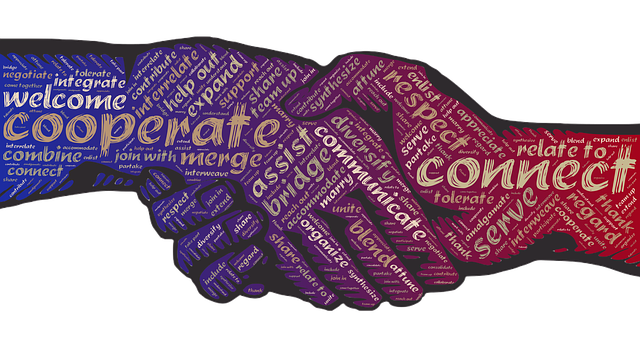Cooperation
 The modern world faces many global issues – terrorism, global warming, refugees, depleted fisheries, deforestation… The list is long. The solutions to these issues all have one commonality – they require cooperation. Psychologists study how to improve cooperation in order to make a group more productive. Extending this sense of cooperation to a much larger, globalized community is rather difficult. What are the steps that we can take to improve cooperation? What are the obstacles that we face?
The modern world faces many global issues – terrorism, global warming, refugees, depleted fisheries, deforestation… The list is long. The solutions to these issues all have one commonality – they require cooperation. Psychologists study how to improve cooperation in order to make a group more productive. Extending this sense of cooperation to a much larger, globalized community is rather difficult. What are the steps that we can take to improve cooperation? What are the obstacles that we face?
Cooperation is a form of pro-social behaviour. It is when people work together with commonly agreed-upon goals, instead of working separately in competition.
Cooperation is the ideal in solving many global issues, but when we are left to our own devices, most people behave in their own self-interest, even though a resource is rapidly depleted. Bicchieri (2006) argues that social norms are an important reason why people cooperate. She suggests that conforming to the norm depends on believing that a sufficient number of others will conform and that a sufficient number of others expect the person to conform. The second condition often can be fulfilled by a society passing laws – such as, fining people who litter – or imposing limitations such as water rationing or only allowing people to drive in the city every other day. But even when these societal norms are put into law, that doesn’t mean that people will follow them. What might be the factors that affect whether people cooperate or not?
Research in psychology: Dawes et al. 1986
 The aim of this study was to investigate whether an individual's decision to cooperate (or not) was the due to greed or the fear of loss.
The aim of this study was to investigate whether an individual's decision to cooperate (or not) was the due to greed or the fear of loss.
Participants were allocated to groups of seven people. Each group member was given five dollars. They were told that if at least three members of the group donated his five dollars to the experimenter, then everyone in the group would then receive ten dollars. Of course, that means that if you gave your five dollars away and received ten dollars, you would then have a total of ten dollars. If, however, you kept your five dollars and there were at least three members of the group that gave their five dollars to the experimenter, then you would end up with 15 dollars total. If fewer than three people donated their five dollars, no reward would be provided and the donations would not be returned.
The levels of the independent variable
Standard dilemma (control group): people who donate and not enough others do= no money back. people who do not donate and enough others do get $15
Money-back condition people who donate but not enough others do either get their payment back (money back) i.e walk away with $5
Enforced contribution group (where the difference with control is that people who don’t donate either get rewarded ($15) so meanness is incentivized or people who don’t donate do not get rewarded as their bonus is halved ($10)
The researchers found that about 51% of the participants donated their money. Did those who didn’t donate do so out of fear of losing their money or out of greed? There were two other conditions in the experiment which seem to support that it was greed, rather than the potential loss of their donation.
When the researchers told the participants that if they gave a donation but not enough people did, they would get back their donation. Although this condition eliminated the fear of losing their $5 as the result of giving it to the group, the participants could still make $15 rather than $10 by keeping it whenever enough others gave their $5 to yield the $10 bonus.
When they told the participants that if there were three anonymous donors, even if they did not donate, they would still receive the bonus, but that no one would have more than $10 total - then the number of people that donated increased significantly (87%). This makes sense because if greed is the motive for not contributing, eliminating the incentive for it should enhance contributing.
Thank you to Jérémie Thibault Alexis for helping me to clarify this study.
Factors influencing cooperation
Although Dawes et al’s (1986) study appears to show that greed can play a role in one’s lack of cooperation, research shows that there are several factors that may influence one’s willingness to cooperate.
One factor that determines whether individuals cooperate or compete is the nature of the situation itself. We all know that teachers can create a competitive spirit in a classroom – or a cooperative one. It comes down to the classroom norms. In a history class, is the class focused on competitive debates where someone always “wins?” – or is the class focused on consensus building in trying to solve problems?
ATL: Be an inquirer
 The question of whether competition helps or hinders learning is one that is hotly debated. Are students who are in non-competitive academic environments actually "not being prepared for the real world?" Or are competitive schools leading to lower self-esteem and motivation for a lot of our students? Most importantly - does it affect learning?
The question of whether competition helps or hinders learning is one that is hotly debated. Are students who are in non-competitive academic environments actually "not being prepared for the real world?" Or are competitive schools leading to lower self-esteem and motivation for a lot of our students? Most importantly - does it affect learning?
You have been asked to make a presentation to the school board about the effect of competition on learning. In order to prepare, it would be best for you to get some data from your own school community. How could you design an experiment that demonstrated the effect of competition on learning?
When designing your experiment think about the following:
- How would you operationalize your variables?
- Which design would you use - repeated measures or independent samples? Why would you choose that design?
- What would be your procedure? Would it be easily replicated?
- What would be the ethical consideration necessary when running your experiment?
When designing your experiment think about the following:
How would you operationalize your variables?
It is important that students decide how they will "manipulate" the level of competition and how they will measure "learning." Both tasks are difficult to do. They might have a reading comprehension exercise as a race, have a team competition for learning something in science, or having students prepare for a spelling competition (for example).
Which design would you use - repeated measures or independent samples? Why would you choose that design?
Either design is appropriate, but they have different limitations. The repeated measures design controls for individual differences (participant variability); the independent samples design allows for the same materials to be used in both conditions and controls for order effects.
What would be your procedure? Would it be easily replicated?
These will be different depending on what the students choose as their IV and DV.
What would be the ethical consideration necessary when running your experiment?
It would be important that there is no undue stress when carrying out the study. The teacher might suggest that certain students not be asked to take part in the study. There is also the importance of getting permission from the parents for their children to take part in the study. The debriefing is not only for the school board, but it would be important to debrief the children, their parents, and the teachers involved.
The behaviour of others in our group may also affect our willingness to cooperate. Decisions about whether to cooperate or compete are also influenced by expectations about the likely behaviour of others. The tendency to think that others will act in a competitive manner is more likely to cause problems when we are not sure what others are going to do. When we have a good idea of what the others in the situation are doing, we will likely match our responses to theirs. So when we see that others are cooperating, we are likely to cooperate as well. This is a form of informational social influence.
Kerr (1983) carried out an experiment in which 75 undergraduates ((39 males, 36 females) were asked to pump air, pressing a small rubber bulb in each hand for 30 seconds. The air was collected and measured by a spirometer. The participants were in one of four conditions: Alone (the control), with a capable partner who worked hard, with a capable partner who was not working hard, or individually, but with someone who was doing the test at the same time and not showing much effort.
Kerr found that those that worked with a capable partner who was working hard pumped less air than when they were pumping air by themselves; they exhibited what the researchers called the free-riding effect. Those that worked with a capable partner who did not pull his weight also pumped less air - a phenomenon known as the sucker effect. The sucker effect (also known as social loafing) occurs when people perceive that they are doing more than their fair share of the group's work; one way to reduce the injustice of such a situation is to reduce their own level of effort. Interestingly, in the fourth condition, the results were similar to the control condition. This indicates that our willingness to cooperate or not is not simply an imitation of a model’s behaviour, but rather a desire not to be a “sucker” and do more work than everyone else.
Sattler & Kerr (1991) found that social norms that encourage cooperation play a key role in behaviour. In their experiment, one group of participants first listened to members of a group who had just completed the game that the new participants were about to start. These group members were actually confederates, working with the researcher. They made statements like, “Maybe I could have gotten more if I was greedy, but I just couldn’t do it. If I’m in a group, I’m going to try to do what helps the group, not just myself!” A control group did not hear such statements prior to the task. The researchers found that those that had heard the statements before the game, were less competitive and were more cooperative than those that did not hear the statements about cooperation.
Group size also has an effect on one’s willingness to help. It is often the case that cooperation decreases in larger groups. One explanation for this is that as the number of group members increases, each person’s behaviour becomes less identifiable, which is likely to increase free riding. Furthermore, people feel that they can make less of a difference in the outcome of larger groups. Larger groups may also lead to deindividuation – that is, a loss of self-awareness and a feeling of being anonymous – and thus not feeling the pressure to conform to a social norm of cooperation.
A final variable that may affect one’s willingness to cooperate may be culture. Gabrenya, Wang & Latané (1985) studied schoolchildren from the United States (an individualistic society) and Taiwan (a collectivistic society). They carried out an auditory task that required counting tone patterns either alone or in pairs. Americans tended to show a lack of cooperation – or social loafing – when in pairs, but demonstrated strong effort when alone, when one’s individual contribution would be clearly noted. The Taiwanese students demonstrated cooperation when working in pairs – doing better when working with someone than when working alone.
ATL: International mindedness
 When trying to address international problems, one of the key issues is a sense of inequality. For example, in the case of deforestation or air pollution, many developed countries often feel that it is unfair for countries like the EU, US or Australia to lecture them on environmental standards, considering that these countries have achieved their level of economic development by past (and present) behaviours that were harmful to the environment.
When trying to address international problems, one of the key issues is a sense of inequality. For example, in the case of deforestation or air pollution, many developed countries often feel that it is unfair for countries like the EU, US or Australia to lecture them on environmental standards, considering that these countries have achieved their level of economic development by past (and present) behaviours that were harmful to the environment.
Based on what you have learned in this lesson, what might be a possible way to increase the level of international cooperation to improve the global air quality?
There are several potential responses. They include looking at how financial incentives may make a difference. Labeling products sold in the West as "sustainable" has become a trend. Companies that do not follow environmentally sustainable practices are not able to use this label. A recent explanation of this can be seen in the case of Korindo, a Korean palm oil producer.
Another way is to create a social norm (a global norm) for protecting the planet. This can only be achieved if the nations that are more developed begin to have a common voice for protecting the environment.
Finally, appeals to collectivism and showing people that there is a very important value in adopting these practices should lead to cooperation. As we will see in the study by Sherif, superordinate problems lead to cooperation. Unfortunately, as we are seeing with increased climate change, it may take a series of disasters for people to realize the extent of the problem that we are facing in order for them to cooperate on reaching a solution.
Other ways to increase cooperation can be found in the pro-social behaviour chapter – in the section on promoting pro-social behaviour.
Checking for understanding
Which of the following is not one of Bicchieri’s conditions for cooperation?
According to Dawes et al’s (1984) study, people often don’t cooperate because
Kerr’s study showed that when we work with people who are competent but who are not doing their fair share, we tend to do less work. This is known as
Which of the following is not a limitation of Kerr’s study on cooperation?
The study is incredibly artifiicial and thus has low ecological validity. It therefore may not predict what happens in the real world in naturalistic conditions. The sample was also only men, meaning that we cannot generalize these findings to women. The study is highly standardized - so this means that it may have high reliability.
The psychological term used for the feeling in a large group that one’s behavior will not be noticed; a feeling of being anonymous.
According to Gabrenya et al, what factor seems to increase one’s willingness to cooperate with a group?

 IB Docs (2) Team
IB Docs (2) Team
